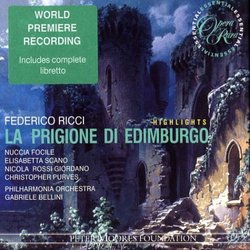| All Artists: Federico Ricci, Gabriele Bellini, Philharmonia Orchestra of London, Christopher Purves, Colin Lee, Dean Robinson, Elisabetta Scano, Nicola Rossi, Nuccia Focile, Rebecca von Lipinski Title: Federico Ricci: La prigione di Edimburgo (Highlights) Members Wishing: 1 Total Copies: 0 Label: Opera Rara UK Release Date: 6/8/2004 Album Type: Import Genre: Classical Style: Opera & Classical Vocal Number of Discs: 1 SwapaCD Credits: 1 UPC: 792938022826 |
Search - Federico Ricci, Gabriele Bellini, Philharmonia Orchestra of London :: Federico Ricci: La prigione di Edimburgo (Highlights)
 | Federico Ricci, Gabriele Bellini, Philharmonia Orchestra of London Federico Ricci: La prigione di Edimburgo (Highlights) Genre: Classical |
Larger Image |
CD Details |
CD ReviewsMore than a Curiousity dwadefoley | New York, New York United States | 12/28/2004 (5 out of 5 stars) "With this new release, Opera Rara continues its yeoman service of revamping the image of discarded Italian composers of the 19th century. Having given loving attention to Mercadante and Pacini, they now turn to Federico Ricci, recording this album of highlights from his 1838 hit, La Prigione d'Edimburgo.
Jeremy Commons relates in his essay in the accompanying booklet that the two sopranos who originally created the co-heroines Giovanna and Ida had voices remarkably similar in timbre and range. Opera Rara cast Elisabetta Scano and Nuccia Focile in the roles, and so have opted for historical accuracy. Scano, though she has a wonderful voice, is the weak link in terms of casting. Her voice is perfectly suited to a comic opera - it is agile, clear, and very pretty, with some ravishing high notes. Indeed, Scano was delightful in Opera Rara's recording of Donizetti's one-act farsa La Romanzesca, and both she and Focile score a hit in the Il Salotto series. However, La Prigione di Edimburgo is a primarily serious, melodramatic work; the two sopranos are rivals in love and over a baby, a situation that ought to be emotionally intense. Scano, as Dorothy Parker once quipped, runs the gamut of emotions from A to B, using virtually no expression and sounding exactly the same whether the libretto says she is having a passionate outburst or it's an ordinary utterance. Focile has all of Scano's strengths, but is better suited to her role as the mad gypsy girl, Giovanna. She is not afraid to express differing moods, and to use her chest voice. She single-handedly maintains the sense of drama in their big 3-part duet. The one number that from this opera that outlived the work itself is Tom's barcarolle "Sulla poppa del mio brich", a delightful buffo number that was still being performed by basses and baritones into the 20th century. Christopher Purves begins this showpiece reservedly, but gradually gains confidence and obtains the level of hamminess needed to make a hit out of the aria. However, the real find in this recording is tenor Nicola Rossi Giordano as Giorgio, whose beautiful voice we hear in the sextet and his big love duet with Focile. Giordano's voice is gorgeous, and a tad more heroic than the coloratura specialists normally required by Opera Rara. I found myself thinking more than once of Bergonzi, but the sound is all his own. Too bad Opera Rara left the tenor's aria out of the recording. Ricci's music is largely conventional in form and melody, but it is beautiful and highly enjoyable nonetheless - and not without original touches. There are bits of local color, such as Focile's cavatina, which abruptly flip-flops from ordinary larghetto to a tarantella with more exotic harmonies to suggest her gipsy background. The obligatory concerted act-finale is gorgeous, seamlessly weaving together a conventional ensemble and a heartrending solo mad-scene for soprano. The finale, with its peculiar and tense dramatic situation (Giovanna lowers a baby in a cradle by rope from a burning building) is handled by Ricci with grace and admirable subtlety of scoring. Best of all are Giovanna's lovely duets with Ida and Giorgio. The booklet is a marvel. In a fascinating and highly readable essay, Jeremy Commons familiarizes us with not just Federico, but his brother and frequent collaborator, Luigi and their highly musical family. Commons spins a gripping family epic that would itself not be out of place on an operatic stage. Having corresponded for years with the great-great-great niece of Federico Ricci, Commons relays juicy bits of scandal, moving tragedy, and tales of Federico's moral self-righteousness and selfless love towards his family members. Biographical detail is seamlessly interwoven with analysis of the music of the opera, its genesis, and its reception in subsequent performances. The essay is a brilliant introduction to a composer who would otherwise be little more than a name to most, and presents the Riccis and the artistic world they inhabited in the round. Staring back at us from the pages of the essay are the singers who created the roles in various 19th-century productions, in excellent reproductions of contemporary drawings. A complete list of the casts of all known productions compiled by Tom Kaufman follows Commons' essay, and the libretto of the entire opera is included, with the recorded passages highlighted in blue for easy reference. Vibrant color photos of the recordings sessions are a standard feature of Opera Rara releases, showing a lot of hard work - but also a sense of real enjoyment on the part of all the participants in the project. This is possibly the best booklet Opera Rara has yet produced (and that is saying something). This new recording is a fascinating, tantalising glimpse of a forgotten composer, and whets the appetite for more Ricci works - let's hope Opera Rara tackles Corrado d'Altamura, or Michelangelo e Rolla soon. " |
